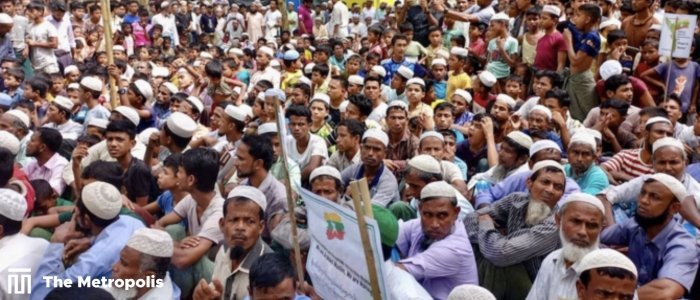Metropolis Desk-
Following a renewed UN appeal for the persecuted minority to be safely and sustainably repatriated to their country of origin, Rohingya campaigners in Bangladesh are urging the international community to put further pressure on Myanmar.
The military crackdown in 2017 that resulted in thousands of deaths and tens of thousands of displaced people from Rakhine State is only one example of the systematic discrimination and persecution that Rohingya Muslims and other minorities have experienced for decades in Myanmar.
One of the most recent organizations to urge the Naypyidaw government to create “conducive conditions for the voluntary, safe, dignified and sustainable” repatriation is the UN Human Rights Council, which earlier this month adopted a resolution on the Rohingya and other minority groups in Myanmar.
Mohammed Rezuwan Khan, a Rohingya rights activist in Cox’s Bazar, told Arab News this week that the international community should exert considerably more pressure on the Myanmar government to achieve a sustainable return.
“We are all Rohingya, and we want to go home. However, the environment in Rakhine ought to be favorable. If we go back now, the Myanmar government would treat us badly once more.
Khan is one of more than a million Rohingya refugees suffering in Bangladeshi refugee camps, which have long harbored and supported them despite Bangladesh not being a member of the 1951 UN Refugee Convention.
The developing country spends an estimated $1.2 billion annually to support the Rohingya, as international aid for the community has been dropping since 2020. The UN World Food Programme cut food rations for the group earlier this year, as its pleas for donations had not been met.
The Rohingya community in Cox’s Bazar is suffering as it seeks certainty about its future, Khan said.
“If we are forced to live here for a longer period, it will create a lost generation of Rohingya,” he said, alluding to the lack of educational and work opportunities for the community.
Rohingya in Myanmar also feel “they are not safe enough,” Khan said, while those in Bangladesh similarly feel unsafe due to rising crime in the camps.
“A sense of insecurity prevails here among us all the time,” Khan said.
“I don’t know when I would be killed by whom; that’s why we don’t want to continue living here. We appeal to the international community to ensure a sustainable solution to this Rohingya crisis.”
An increasing number of Rohingya risk perilous boat journeys to leave Bangladesh for countries such as Malaysia and Indonesia. In 2022, over 3,500 attempted dangerous sea crossings, according to the UNHCR.
Despite various plans for the Rohingya to return to Myanmar over the years, no practical progress has been made. The latest attempt took place in May, involving refugee community leaders and Bangladeshi officials visiting Rakhine State to assess the possibility of repatriation.
Mohammad Jubaer, chairman of the Arakan Rohingya Society for Peace and Human Rights in Cox’s Bazar, highlighted the importance of accountability.
The international community should guarantee some accountability problems, such as respect for human dignity and security. There should be a safe zone maintained by the international community where we would be residing in Myanmar. Otherwise, the Myanmar government would once more take us against our will to Bangladesh, as they did before,” Jubaer warned.
“The Rohingya persecution problem is not the sole one. The protection of all other ethnic minority groups in Myanmar is necessary, he stated.
“To ensure this, the international community should put more pressure on Myanmar.”
The Rohingya problem places “ethical responsibilities” on developed nations and multilateral organizations, according to Mohammed Nur Khan, a Bangladeshi rights advocate and migration specialist.
Since they are in a better position than most people in terms of their financial and political standing, morally speaking, greater responsibility falls to them. They might start by opening the dialogue on the UN platform. It’s vital,” Khan said to Arab News.
“Secondly, they can use various tactics, such as enforcing economic sanctions and others, to force the Myanmar junta to create a conducive climate. The international community ought to actively participate in regional organizations like ASEAN, he said.
The most recent UN decision, according to Khan, may encourage the Myanmar government to make greater attempts to ameliorate conditions in Rakhine State, but Khan is doubtful that it would effectively create a welcoming climate for the Rohingya.
The UN resolution came after prominent visitors, including OIC Secretary-General Hissein Brahim Taha and Chief Prosecutor of the International Criminal Court Karim Khan, visited refugee camps in Bangladesh.
But even if it takes time, it should be completed. Repatriating the Rohingya would not be the best course of action if this weren’t guaranteed. I don’t believe that anyone can live in a secure atmosphere now given the current circumstances in Rakhine.
Source- Arab News



